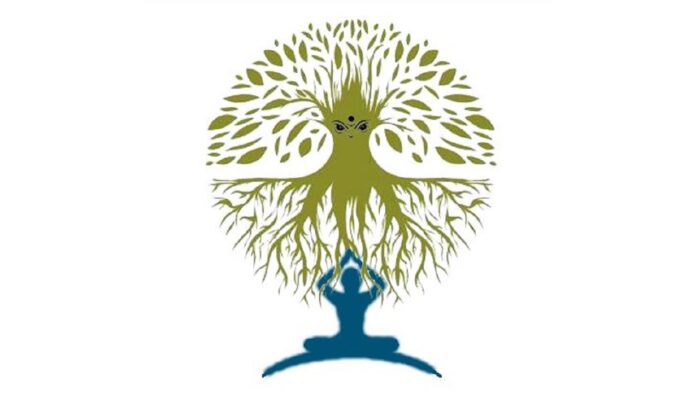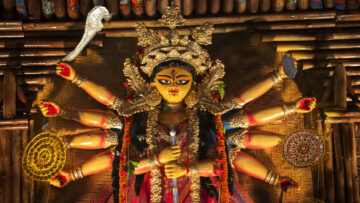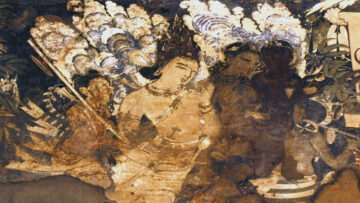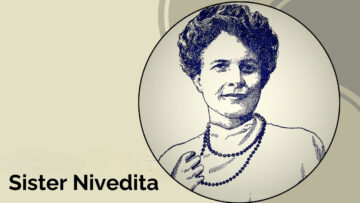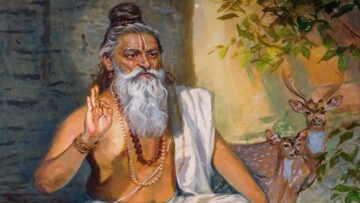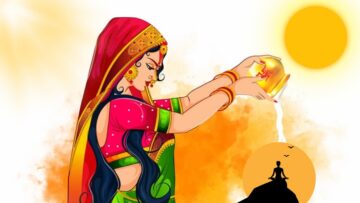……..Continued from Part II
Choodala flew back to her palace to attend to her duties. After three days, she returned to her husband and found him still in a trance. Though delighted, she wanted to wake him up. She wanted him to go back to his duties and realize he could still escape being tainted from the vasanas while being immersed in the life of a king if he could be truly detached.
She landed before Sikhidhwaja, roaring like a lion. Her husband did not wake up from his trance. She shook him bodily. He still would not wake up! Choodala decided to shake him harder. Sikhidhwaja rolled over but would still not wake up from his trance.
Choodala wondered if she should even try to wake him from such a deep trance. Perhaps it was better just to let him be. But was he alive? She felt his heart and knew he was.
Choodala took a minute form and entered her husband’s body, reawakening his consciousness. Then she quickly exited his body and started reciting the musical verses of Samaveda.
Sikhidhwaja found his Guru, Kumba, singing before him when he awoke. He said, “Bhagavan! I am so glad you came back.”
Kumbha said, “I thought of you even while in Swarga! This time I could not even find pleasure in Svarga! I don’t think I can find a more trusted friend anywhere. I am delighted to be back!”
“Then you must stay here with me! You taught me strategies to find stillness and peace here in this forest. I am sure even Swarga cannot offer that!”
The two friends spent many days talking to each other. They roamed the forest and visited many villages, towns, and pilgrimage centres. Those who saw them together were wonderstruck at their camaraderie and easy friendship. Sikhidhwaja matured under Kumbha’s persuasive tutelage.
But Choodala’s work was only half done. The more onerous part of getting him to shoulder his responsibilities was still ahead. She had only instructed her husband on the philosophical precepts. She needed to convince him that performing real-life duties was essential to be a finished Rajarshi as it was to internalize the concepts. She had taught him that it was necessary to eschew the attachments that anchored him to samsara. But she still had to teach him that having attained yoga, he must perform his duties from an exalted plane of a realized yogi according to dharma, with wisdom and detachment. She had a more onerous burden of making him understand that enjoying pleasures within the strictures of dharma and rta was not in opposition to finding liberation for a true renunciate.
Choodala knew she must somehow tell her husband she was Kumbha. Then she had to make Sikhidhwaja fall in love with her again. She wondered what her next course of action would be.
“Today is Yugadi, the first day of Chaitra. I am participating in the festivities in Indra’s palace with my father. But I will come back this evening. I would rather be with you than stay in Swarga!”
Sikhidhwaja implored Kumbha to return as soon as he could.
When she reached her palace, Choodala morphed into her true form and hurried through her duties before returning to her husband in the evening.
Kumbha’s face was heavy with care when he appeared before Sikhidhwaja. Distressed, Sikhidhwaja rose hurriedly and said, “Sage! My salutations to you! Why do you look so downcast? Please sit! I am dismayed that a jnani like you is bothered by joys and sorrows like this.”
Kumbha said, “Rajan, what you say is right. Still, so long as we are tied to the body, distress related to our bodies is inescapable. But a jnani is not anguished because he does identify with his body. Whether ignorant or wise, every being must go through happiness and suffering according to the karma accrued from past actions. No one can escape his karma.”
Sikhidhwaja said, “True. But tell me, what has distressed you so?”
Kumbha said, “I will tell you. If I share my unhappiness with my dear friend, my heart will feel lighter. After taking leave of you this morning, I attended Indra’s assembly. I sat next to my father and took part in the proceedings. After we were done, I set out flying.
“When I touched the clouds, I saw Sage Durvasa travelling like me through rain-laden grey clouds. His body was wet with water and smelled of sandal paste. I smiled a greeting and said, ‘Sage! Powered by immense tapasya, you look particularly fetching today, dressed as you are in heavy grey clouds and lightning!’ Was that wrong? Somehow the sage felt insulted and took offence.
“Sage Durvasa is known to be short-tempered. He cursed me, ‘Fool! You will pay the price of ridicule. Every night from tonight onwards, you will become a woman. Your body, attitude, and deportment will become feminine.’ Even before I could take in his words, he had disappeared. The curse saddens me. I shall most definitely turn into a young woman tonight. How can I face my father? No one can never predict what troubles are lurking around the corner every minute!”
He fell silent. Then, on a more optimistic note, he said, “Still, I am the same person!”
Sikhidhwaja said, “Dear friend! The body will go through many changes over time. But Atman, who is observing everything, is not touched by them. A jnani might react to upheavals like anyone else. As you have told me once before, it endears you to everyone else. But take heart. Get out of your sadness.”
Soon the sun sank into the westerly horizon. After their evening sandhya prayers, the two friends sat under a tree.
Before long, Kumbha transformed into a woman. “Oh no! My body is changing. My hair has become lush and long! How come even my attire has become feminine? I am now really a woman! Even my emotions are becoming feminine!” He sat silent in silent trepidation.
Sikhidhwaja watched the transformation in amazement and sorrow and tried to console his friend as best as he could. Because this change was inevitable, it must be borne, they said, and decided to experience and learn from what was happening to them.
Both slept in the same bed without being affected in any way. Soon after sunrise, Kumbha turned back into a man.
Thus, Choodala started living with her husband as Kumbha during the daytime and as a woman at night. For many days, they continued as good friends and travelled everywhere.
Some days later, Kumbha said, “Rajan, listen to me. It seems I cannot escape becoming a woman every night. So, I have decided to fully enjoy the experience of being a woman. I want to marry a worthy man and give myself to him. No one is dearer to me or more worthy in all three worlds. Dear friend, marry me. I want to experience being a woman with you. Please say yes! It is the most universally natural thing for the female of any species to mate with the male. Why should we deny ourselves this experience? We are not doing anything wrong by marrying, are we?”
Sikhidhwaja said, “Dear friend, I agree that we will not do anything wrong by marrying. We have experienced that the universe is an expression of Brahman. Let us do it!”
Kumbha said, “Tonight, on Sravana Purnima, let us marry after the moonrise. The Mahendra Mountain has lush fruit-bearing trees and beautiful flowering shrubs and vines. This cave can serve as our nuptial chamber. Let us get ready!”
They bathed in the calm waters of River Mandakini. They dressed in beautiful new clothes materialized by the wish-giving Kalpa tree and worshipped their ancestors, sages, and gods. They ate a sumptuous, tasty meal, finishing it with the fruit they had gathered.
The sun seemed to set sooner that day, and Kumbha lighted the mountain peaks with shiny bright lamps he had materialized using his siddhis. Morphing into a beautiful woman dressed in fine clothes and jewels, Kumbha walked to Sikhidhwaja and said, “Rajan! I am now Madanika, your wife!” Smiling demurely, she said, “You look more handsome than Manmatha[1] himself when he wed Rati! With Agni as the witness, accept me as your wife!”
Overjoyed, Sikhdhwaja said, “My love! You look as beautiful as Goddess Lakshmi! May our union be as blessed as the union of Vishnu with Lakshmi, Shiva with Gouri, and Indra with Sachi! I cannot express my happiness in words!”
They went round the Agni ceremonially.
Once the wedding rituals were complete, they repaired to the cave, which they had decorated with sweet-smelling flowers. They made love to each other with sweet words and sensual touch.
The sunrise came too soon. Although saddened that his wife was turning into Kumbha, Sikhidhwaja maintained his equanimity. The two continued as close friends during the day and as a loving couple during the night. They continued their peregrinations and visited majestic mountains like Sahyadri, Kailasa, Mahendra, Malaya, and Gandhamadana, roamed the forests, and bathed in many rivers.
Choodala would return to the capital once every three days unbeknownst to Sikhidhwajato take care of work while he slept.
Days passed, and Choodala knew it was time to take the next step. But before that, she had to test if Sikhidhwaja was ready.
Soon after that, Indra appeared before Sihidhwaja, who received his guest with due honours. “Devendra, I must have done something good to merit this visit from you.”
Indra replied affectionately, “Rajan, I have heard great things about you. I had to have the honour of meeting you and took the opportunity to visit you with my retinue of Devas. I have come here to invite you to my realm. The Deva maidens are awaiting your arrival there. Please come to Swarga, which is a fit abode for you. O Jivanmukta, you may stay there for as long as you like and enjoy everything we offer. I have come here to take you with me.”
Surprised, Sikhidhwaja said, “O Devendra, I have enjoyed all the pleasuresSwargaloka can possibly offer. But I enjoy every place like Swarga, and I am happy. Thankyou for inviting me, but I do not aspire to the pleasures of Swarga, and I am happy where I am. Please forgive me for declining the loving honour you conferred upon me!”
Devas went back.
Choodala, who had created this encounter between Sikhidhwaja and Devendra through her Yogic powers, knew that the king’s mind was no longer given to the lure of the senses. Sikhidhwaja had passed her test with flying colours.
But she had to test him just one more time.
Sikhidhwaja sat meditating on the banks of Mandakini. The night was young, and the full moon looked like a golden orb in the starlit sky. The fragrance-laden cool breeze was heady enough to make even seasoned Yogis contemplate romance.
Madanika entered a nearby bower to meet the handsome man waiting for her, who bounded forward to fold her into a close embrace. They soon reposed on the sweet-smelling bed of flowers, engaged in lovemaking.
After his Sandhya prayers, Sikhidhwaja wandered into the bower searching for his wife and found her engaged in a clinch with her young loveron the flower bed. Her hair and dress were mussed up due to frantic lovemaking. The king looked at them for a long minute andwalked out after deciding not to interrupt their love-play. He breathed deeply, quelling his anger, and sat calmly on a rock.
Soon, a happily tired Madanika came to Sikhidhwaja looking replete and abashed and sat near him. After a while, the king woke from meditation and looked at her. He said, “O beautiful Madanika! Did you interrupt your lovemaking to come here? It was not necessary. All animals long for sexual fulfillment. You can return to your lover and please him until both of you are sated. Don’t desist on my account. I will not be perturbed. We must understand that what makes us happy will also potentially make another happy. Kumbha and I are of one mind and detached from passions. Perhaps because you were born out of Sage Durvasa’s curse, you seem different and easily swayed by your passions.”
Madanika said, “Well, perhaps women are indeed more emotional. When that handsome man importuned me for love, I was affected. Unable to refuse him, I gave in. Please don’t be angry with me and forgive me.”
“I am not angry at all!” Sikhidhwaja said, “We can be friends as always. But we will not continue as a married couple since good society frowns upon your behaviour.”
Impressed by Sikhidhwaja’s calmness and even temper, Choodala thought, “The king has conquered passion and anger. He is not lured by sensual pleasures or the love of transcendental Siddhis. He has attained jnana.” She decided to reveal herself.
Sihidhwaja looked at her in wonder and asked, “Choodala! Are you Madanika?”
Choodala said, “Yes, I am Choodala. O dearest one, it was I that initiated you into the mysteries of Atma Jnana, assuming the forms of Kumbha and Madanika. I had to use this ruse to instruct you. You will know the truth in your meditative trance.”
Sikhidhwaja went into a meditative trance and reviewed the events of his life since he had left his country. After slowly emerging to consciousness, he looked at Choodala standing before him. Joyously embracing her, he said, “You have been a peerless Guru! There is no one like you. How can I repay you?”
Choodala smiled. “I only did my duty. I am happy you are free from all petty worldly actions, sankalpas and vikalpas. What do you plan to do now?”
Sikhidhwaja said, “You are my spiritual teacher. Advise me.”
Choodala said, “Please resume the kingly duties that you relinquished. As an enlightened one, you can do it from an elevated plane. We can perform our duties until it is time to go to the forest.”
Sikhidhwaja laughed. “Dear wife! If your desire for pleasure is so great, why not just go to Swarga? Why must we return to worldly struggles to gain pleasure?”
Choodala said, “Rajan, we do not differentiate between realising our desire and rejection. Our emotions are not tied to our sensory pleasures or pains. But we have a duty to administer the country faithfully. And just as we manage the difficulties arising from performing our duties, we don’t reject the pleasures arising from it, either. A jnani must realize that his happiness is not tied to sensory pleasures. He is not happy because he is a king or in Swarga. Similarly, he is not perturbed by any difficulty. Therefore, when his reaction to joy or sorrow becomes diminished, he is always happy.”
Sikhidhwaja said, “You are right. When you are not worried about potential joys and sorrows, not beset by desires and dislikes, and receive whatever chance throws your way, ruling a country is also a spiritual pursuit.”
Vasistha concluded, “O Rama, you have heard the story of Choodala, the ideal wife who became her husband’s teacher and led him to the right path. This story will teach you to do your duty without longing for the fruits of your karmas. You will learn the true meaning of renunciation, which will lead towards jnana; and it is only through jnana that you can enjoy real bliss and emancipation.”
…..End
[1]God of love
Feature Image Credit: Akash K
Disclaimer: The opinions expressed in this article belong to the author. Indic Today is neither responsible nor liable for the accuracy, completeness, suitability, or validity of any information in the article.

